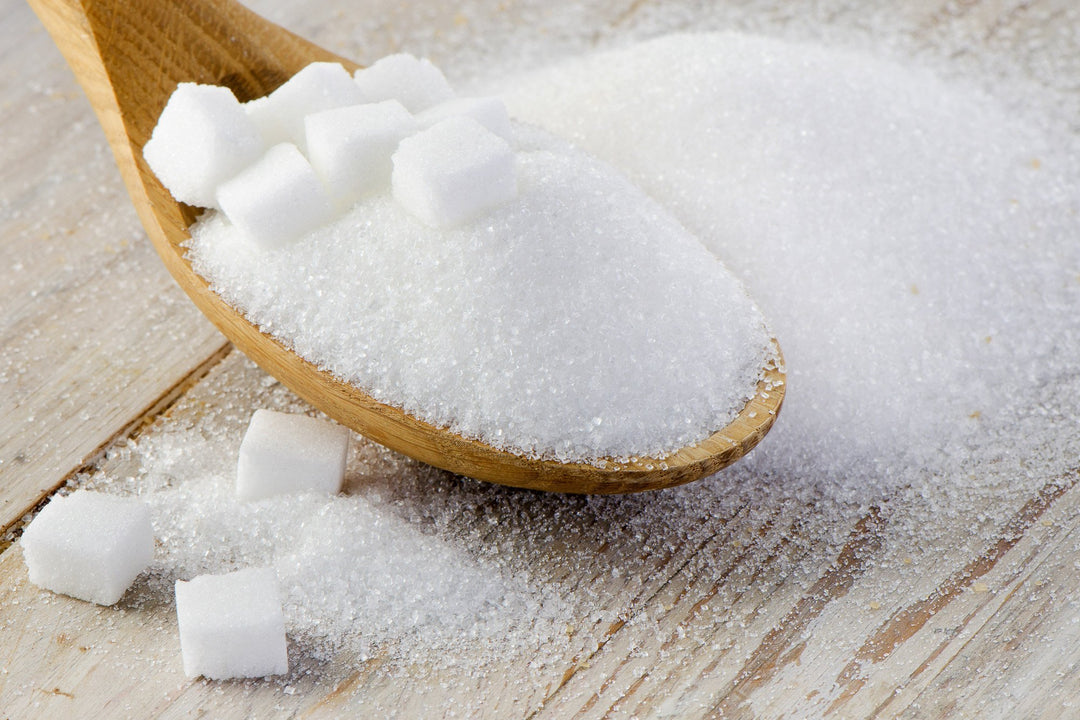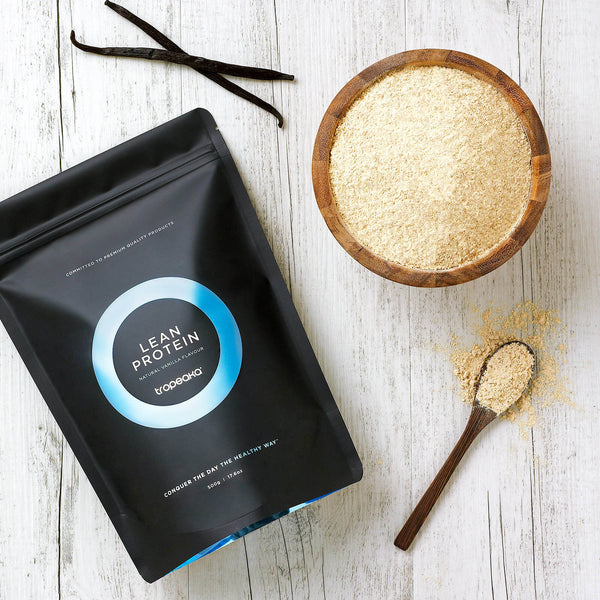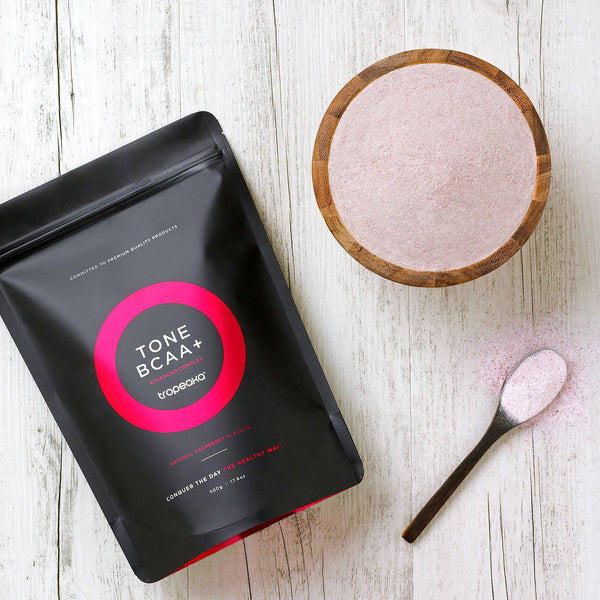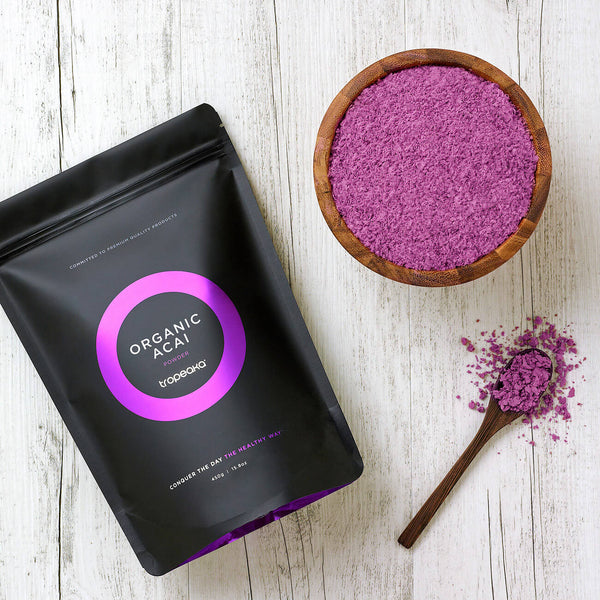The overconsumption of refined sugar is leading to drastic increases in obesity, diabetes, heart disease and cancer.
T
oday no one is shocked at hearing that refined sugar in the form of soda, sweets, lollies, and processed junk food is bad for your health.
However it’s a simple truth that is widely ignored despite our culture’s ongoing love obsession with processed sweets.
What’s most concerning is society’s lack of understanding as to how refined sugar is damaging your health. The overconsumption of junk food in our modern-life is leading to epidemics of obesity, diabetes, heart disease and cancer just to name a few.
We’re going to look at 27 shocking truths about refined sugar, and how an overconsumption of it leads to the onset of disease and an increased risk of premature death.
1
The Recommended Daily Intake of Sugar is Less Than What You Expect
The Dieticians Association of Australia recommends 90g of sugar per day for an average adult. Although this seems like a large amount, it’s actually far less than you think.
For example, just be consuming a 600ml of Coca Cola you would have had 64g of refined sugar over two-thirds of your recommended daily intake. Or perhaps you might reach for a 500ml Lipton Ice Tea, a perceived healthier option, which still has 26.5g of sugar in its peach flavour, almost one-third of your daily allowance.
Consuming just one of these drinks a day doesn’t even leave appropriate room for daily consumption of 2-4 healthy forms of sugar such as those found naturally in fruit.
2
Refined Sugar Contains No Essential Nutrients
Unlike healthier forms of sugar such as coconut sugar which has a wide variety of nutrients, refined sugars found in junk food have no essential nutrients.
Once they have been heat-processed in a manufacturing plant they are stripped of all nutrient value and are referred to as “empty calories”.
With no vitamins, minerals, essential fats or protein, refined sugar provides no health benefits to the body. On top of this, it taxes the body, particularly the liver as the body attempts to process it and either uses it as energy or store it as fat.
3
It Takes More Than It Gives
As we mentioned in the previous point, refined sugar has no nutritional value. However, on top of this, it actually causes a number of negative consequences in the body as it is processed and moves through the body.
Our bodies work similar to a bank account. In order for a bank account to stay healthy, it requires us to put more money in then what we withdraw. Similarly, our body is like a bank account; it requires us to put healthy nutritionally-dense food into our bodies in order for it to stay healthy, rather than withdrawing health from our body through poor nutritional choices, such as overconsuming refined sugar.
Refined sugar plays a big role in stripping our bodies from key vitamins and minerals, while also burdening our liver as it tries to process the fructose that is within the refined sugar.
4
Our Liver is Burdened By the High Levels of Fructose
Refined sugars are broken down into two simple sugars before entering the bloodstream. These are glucose and fructose.
Glucose is an essential sugar that forms the basis of energy production. However fructose is not essential and when consumed in high amounts can negatively overload the liver, causing it to convert the fructose into fat.
This can lead to a fatty liver when overconsumption is on a regular basis, creating an environment for metabolic disease, including; liver disease, cardiovascular disease and type 2 diabetes.
A 2011 study found that regularly drinking soft drinks/soda increased both liver and skeletal fat by over 100 percent over just a 6 month period
5
It Puts Fat on in all The Wrong Places
Just as overconsumption of refined sugar leads to the risk of developing a fatty liver, it can also lead to weight gain through fat accumulation in areas that will negatively affect your health.
This type of fat is stored around your intestines, liver and pancreas in the form of visceral fat, causing widespread inflammation throughout the body leading to sickness and disease.
Alarmingly, a 2011 study found that regularly drinking soft drinks/soda increased both liver and skeletal fat by over 100 percent over just a 6 month period. This is concerning since most people consume soft drinks/soda for much longer than just 6 months.
An easy way to recognise if you have an issue with visceral fat is a protruding belly, or simply put ‘having a gut.’
If this is the case, it’s highly recommended that you develop a program that cuts out refined sugars, replacing it with raw, wholefoods such as fruits, vegetables, nuts, seeds and our Tropeaka superfood products, while implementing a daily exercise program.
6
You Won’t Feel Full From Refined Sugars
Besides their addictive taste, one of the biggest reasons we find it so easy to overindulge on refined sugars is because our brain doesn’t easily detect the presence of fructose.
A study in the Journal of the American Medical Association found that fructose (present in large quantities in refined sugar) does not have any effect on the brain pathways that glucose does, in particular, the areas of the brain that control appetite.
Essentially, this is saying that the brain does not recognise fructose as nourishment to the body, therefore ignoring the fructose calories in refined sugar.
This coupled with refined sugar’s addictive qualities, makes us crave processed sugary foods while at the same time the calories are not recognised by our body.
However, it’s important to note that consumption of fruit which contains fructose also contains fibre which is an important nutrient for the brain and gut for regulating how full your body feels. Therefore fruit is a healthy and smart way to fuel your body.
7
It Destroys Your Internal Organs
Refined sugars age your body in a number of ways. We’ve already looked at how these sugars have no nutritional value and in fact strip the body from its nutrients.
But further to this point, refined sugars pop up in a range of areas, most notably in soft drinks and junk foods that often contain phosphoric acid, a harmful chemical that preserves soft drinks and gives it their tangy flavour.
Research suggests that phosphoric acid can have damaging effects on your organs, in particular, your kidneys. A study in the Journal of Epidemiology shows a clear increased risk of kidney disease and kidney stones when consuming 2 or more soft drinks/sodas a day.
8
It Leads to Poor Bone Health
Your body is constantly trying to remain in a healthy PH balance. Unhealthy foods that are acidic push your body’s PH balance towards an unhealthy state, while alkalizing foods help maintain a normal state of health.
When we consume highly acidic foods such as sugary drinks this triggers your body to neutralise the acidic nature of the food in order to rebalance your body’s PH.
One nutrient that helps maintain a healthy PH balance within your body is calcium. When you consume processed sugars your body has to draw key nutrients such as calcium from parts of your body in order to alkalize the acidic state.
If calcium is not present (e.g. by eating foods high in calcium such as green leafy vegetables) our bodies will take calcium from our bones. This results in weakened bones, making them vulnerable to osteoporosis over the long-term.
9
It’s Horrible For Your Teeth
OK, yes this isn’t anything new; however are you aware of just how bad sugar is to your teeth?
A combination of refined sugar being highly acidic, as well as the phosphoric acid mentioned above, causes tooth enamel erosion even at low consumption levels, according to a 2007 study published in “General Dentistry.”
Furthermore, bacteria on our teeth that develop into plaque actually use the sugar in a similar way to glue, allowing it to stick to the teeth and not wash away with saliva. This causes ongoing health problems to our teeth until we properly scrub the plaque and bacteria off when brushing.
10
It Leads to Insulin Resistance
Insulin resistance is a precursor to the development of metabolic syndrome a name given to a range of risk factors that generally occur together and raise your risk for heart disease, diabetes and stroke.
Insulin is a hormone which regulates blood glucose levels and how the body uses and stores fat. Insulin signals to the liver, muscle and fat cells to take in glucose from the blood as energy.
However, when you consume excess amounts of glucose in the form of refined sugar, you’re forcing your body to produce more and more insulin, leading to insulin resistance and as mentioned a fast track to metabolic syndrome.
11
Sugar Suppresses the Immune System
Bacteria and yeast are two harmful substances that proliferate in a sick body. Take for example candida, which is a well-known yeast that infects the body, in particular, the digestive tract.
Both bacteria and yeast feed off simple sugars and in doing so boost the spread of these organisms throughout the body. This, in turn, compromises the immune system, which has already been affected due to refined sugars already toxic load on our body’s organs, causing a downward spiral of sickness and disease.
12
It Leads to Chromium Deficiency
Chromium is an essential trace element required for the metabolism of sugar. The real issue arises in the fact that processed sugar contains no chromium and will, therefore, deplete chromium stores, creating a deficiency when future metabolism of sugar needs to occur.
Proper chromium nutrition means a decreased need for insulin, therefore, reducing the risk of insulin sensitivity as mentioned above. Therefore you can see how consuming sugar creates a range of health issues that affect one another, and in turn creating greater health problems.
By eating lots of fresh foods such as fruits and vegetables an average adult is able to meet their required chromium intake for good health.
13
Sugar Reduces Cognitive Performance
Most parents have probably confirmed on countless occasions how sugar affects a child’s behaviour. In fact, between 1979-1983, 803 New York schools reduced the amount of table sugar and eliminated additives such as artificial flavours and preservatives from school breakfasts and lunches.
The change resulted in a 15.7% increase in academic ranking, the greatest improvement in results ever seen.
14
Sugar is Substituted for Important Nutrients
Those with the lowest levels of essential nutrients such as Vitamin A, B, C, magnesium, calcium and iron are also the highest consumers of sugar according to USDA data.
This can be put down to the empty calories that sugar provides as a substitute for real food, as well as the nutrient strain our bodies are faced with when trying to metabolise and excrete sugars.
The moral of the story here is, a diet should be based on real, fresh, wholefoods rather than cheap, processed junk food.
15
It Creates Emotional Mood Swings
Ever feel grumpy or emotionally strung when you’re hungry? Well, the reason is because of unstable blood sugar levels.
When your levels are unstable they lead not only to mood swings but also to headaches and further cravings for sugar, creating a vicious cycle of addiction.
The issue is because of the empty calories, lack of fibre and overall lack of nutrition that refined sugar contains, which in turn does not trigger your brain that it’s full and nutrient complete.
You get the typical spike of energy as the sugars are quickly burned off, and then a sudden drop, resulting in the mood swings as your desire for another ‘energy hit’ is sent from your brain.
16
It Creates Fatigue and Lethargy
The great irony with sugar is that although it provides a source of energy it actually creates much greater fatigue in the long run.
Again this comes down to what was written above in regards to it causing unstable blood sugar levels. You get the sudden rush of energy and then a sudden rapid drop, which results in fatigue and requires another dose of sugar to maintain the same energy levels.
Over the long run your body is patterned to crave and seek out sugar in order to maintain the ‘high’ that it so unnaturally craves, leading to dependency and addiction.
17
It Leads to Stress
When blood sugar levels are low after a sugar spike, stress hormone levels rise as the body reacts to low energy levels from a lack of nutrition. These hormones include adrenaline, cortisol and epinephrine which raise blood sugar levels giving the body that much needed quick boost of energy.
However, the by-product of these stress hormones are irritability, anxiety and stress, leading to cravings for the sugary addictive food your body is trying to stay away from in the first place.
Those who consume 17 to 21 percent of their calories from sugar are 38 percent more likely to die from heart disease
18
It’s a Major Cause of Heart Disease
A 2014 study published in the Journal of the American Medical Association researched the effects of added sugar to the development of cardiovascular diseases. Their findings found a significant relationship between added sugar consumption and the increased risk of death from cardiovascular disease.
It found that those who consume 17 to 21 percent of their calories from sugar are 38 percent more likely to die from heart disease than those that consume 8 percent of their calories from sugar.
Frighteningly just one bottle of soft drink per day will easily exceed the recommended daily intake of refined sugar, being 10% of your total energy intake per day.
19
It Increases Your Risk of Type 2 Diabetes
This isn’t anything ground-breaking and has been known as an obvious truth for a number of years; however, it’s a very important point to re-emphasise.
This 2010 report from Harvard School of Public Health draws a clear relationship between refined sugar and the onset of type 2 diabetes and metabolic syndrome.
Diabetes certainly isn’t something to look past. In 2010 it was the 7th leading cause of death in America and plays a major role in contributing to other complications including hypertension, heart attacks, stroke, blindness, hypoglycaemia, kidney disease and even amputations.
The consumption of refined sugar also leads to chronic inflammation, which research suggests shares a link as a potential cause of cancer
20
There’s a Link Between Sugar and the Development of Cancer
There is widespread growing evidence of a link between the overconsumption of sugar and cancer.
Research is starting to show that elevated insulin levels (a direct result of overconsumption of sugar) can contribute to cancer.
The consumption of refined sugar also leads to chronic inflammation, which research suggests shares a link as a potential cause of cancer.
21
It’s Highly Addictive
Sugar is no different to any other drug in regards to its effects on the brain. Sugar creates a dopamine rush, an event that is triggered in the reward centre of the brain.
In fact, new research has called for sugar to be regulated just as any other harmful drug. However, this is harder said than done considering the industry’s stronghold on government policy.
Addiction is due to dopamine’s highly addictive qualities, which creates a craving for more dopamine, much like any other drug. This, in turn, creates a hunger for another dopamine rush which is easily achieved through eating high-sugar based foods and drinks.
Babies exposed to huge amounts of sugar in the womb continued to make large amounts of insulin after birth
22
Sugar Addiction Can Be Passed Onto New-Borns
Patrick O’Brien a spokesman on behalf of the Royal College of Obstetricians and Gynaecologists stated in a 2011 article that “babies exposed to huge amounts of sugar in the womb continued to make large amounts of insulin after birth…Often, these babies have to be fed early, or more often, they are put on a drip and given glucose.”
By having an addiction at such an early age during critical years of development, a mother can be putting her new-born child’s health at risk, elevating the possibilities of health complications into the future.
23
Sugar Can Raise Your Triglyceride Levels
Triglycerides are the main constituents of natural fats and oils. The issue however of raised triglyceride levels is they are associated with coronary heart disease as well as diabetes and fatty liver disease which we have looked at previously.
It’s no surprise that high triglyceride levels are often caused by insulin resistance, which as we have seen, is caused by an overconsumption of processed sugars.
24
It Increases Your Risk of Developing Gout
Gout is a disease caused by the build-up of uric acid in the blood that creates a painful inflammatory response in tissues and joints.
Researchers in the US and Canada followed the food consumption of over 46,000 men and found that those who consumed 5-6 servings of sugary drinks per week significantly raised their risk of gout by 29%, over those that drank less than one serving of soft drink per month.
25
Sugar Can Cause Hormone Imbalance
Dr Hyman a leading expert in functional medicine describes the impact that sugar has on hormone imbalances in particular insulin imbalances, thyroid imbalances and sex hormone imbalances.
In all three cases, he advocates the critical need to cut out refined sugars, those found in sweets, lollies, sugary drinks and flour based meals.
The underlying trigger of Alzheimer’s may be attributed to long-term overconsumption of processed sugars
26
Refined Sugar Has Been Linked to Alzheimer’s Disease
Research now shows such a strong correlation between insulin resistance and Alzheimer’s disease that it is now commonly referred to as Type 3 Diabetes.
As we’ve seen previously, insulin resistance is very often attributed to the excess consumption of refined sugars. With a correlation between insulin resistance and Alzheimer’s it now speaks for itself that the underlying trigger of Alzheimer’s may be attributed to long-term overconsumption of processed sugars.
27
Sugar Causes Dehydration & Leads to Headaches & Other Complications
Sugar pulls water out of your body in two ways. The first way is through dilution, in which the body has to dilute the sugar in order to keep it from harming your body. The second way is through urination, whereby the body detoxes itself of excess sugar by moving it out of the body through urination.
Both these methods will have a direct effect on your brain, causing headaches as water leaves the body’s tissues. However what is more alarming is the risk factors associated with ongoing dehydration including its effects on organs and the development of kidney stones, cholesterol problems, muscle damage, constipation and chronic issues with your liver and joints.
So How Can We Beat a Sugar Addiction?
Now that we have looked at the shocking effects of refined sugar on your body, it’s best that we now discuss how to beat a sugar addiction. Here are some practical steps below on how you can do it.
i. Substitute Refined Sugar for a Healthy Form of Sugar
As we have mentioned previously, fruit does include fructose, which when taken in a refined state can have major health implications. However, fruit is an excellent way to satisfy sugar cravings, as it contains essential vitamins, nutrients and fibre which not only trigger your brain to identify that it’s being fed, but it also nourishes your body, providing it with life-giving nutrients.
ii. Defeat the Addiction Step-By-Step
It’s going to be a hard challenge to go cold turkey and completely cut out refined sugar. What is more advisable is to cut your intake of sugar by half in the first week and then continue to cut it by half over the following month until you have completely cut out processed sugar.
iii. Recognise Any Hidden Bad Habits
Do you see yourself reaching for a soft drink/soda at 3pm in order to get through your afternoon? Do you indulge in dessert late at night, giving your body no time to burn off that fuel before bed? It’s important to identify bad habits and recognise where you are letting yourself down so you can be aware of it before you do it next time.
iv. Write Down the Goal and Have Clear Objectives
Write down how much processed junk food and sugary drinks you’re consuming (according to the above steps) and determine how much you will reduce it by each week. Finally, write the end date as to when you’ll achieve your goal where your diet will be free of refined sugars. Keep this goal in a place where you can see it so you can constantly be reminded.





